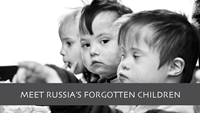Glossary
- Correctional schoolsearch for term
-
See Vspomogatel'naya.
- Detskii Domsearch for term
-
A typical orphanage for children from 5 to 18 years old. In Russia there are several types of orphanages, which are listed separately in this glossary - a 'detskii dom' is the most typical kind of orphanage for children without particular mental or physical difficulties. However, 'detskii dom' is also used as a catch-all term to mean any institution where orphaned children live. As stated, there are several different types of orphanages in Russia, including those for children with special needs, those where children attend the school inside the orphanage and those where children attend neighbourhood school (most detskiye doma are of this type). Orphanages can also differ according to their internal organization and their specific training programmes, which may include dance, sports, and even preparation for a career in the army. In the last decade the number of different types of orphanages has increased.
- Dom Rebyonkasearch for term
-
A state orphanage for children up to 5 years. Some children do remain longer.
- Externatsearch for term
-
A school that provides an opportunity for students to pass the required state school exams without attending daily. Children are supposed to collect assignments from the externat and work by themselves. They can also attend lectures provided by the staff to help the students pass exams. The quality of these lectures varies greatly from externat to externat and in some places the lectures hardly occur at all because teachers neglect to show up at the scheduled times. The Russian Federation's School Curriculum is established by the Ministry of Education and is mandatory for all state schools.
- Five-point grading systemsearch for term
-
The Russian academic grading system where 5 is the best grade and 2 is a fail grade.
- Internatsearch for term
-
A school where children study as well as live. Such schools/homes are often used to house children with learning disabilities and for children who have missed several years of school.
- MHSDsearch for term
-
The majority of orphanages are under the Ministry of Education, whereas MHSD orphanages are run by the Ministry of Health and Social Development "MinZdravsotsrazvitiye" (previously the Ministry of Social Defense "MinSotszaschita"). "MHSD orphanage" is our own term. In English these institutions are also referred to as a "psycho-neurological" orphanages. MHSD orphanages are usually in rural locations and were opened as special homes for children with significant handicaps, whose parents cannot care for them. Many of the children in these institutions, however, are wards of the state -- orphans and social orphans. MHSD orphanages do not provide education or any significant stimulation for the children. At the age of 18 children are transferred directly to adult institutions. They are not eligible for state housing grants and cannot work. In reality this is a slow road to non-being. Yet a large number of children who end up in MHSD orphanages are not handicapped and end up their for reasons as diverse as bad behavior, lack of room in other orphanages, or having diabetes. MHSD orphanage an English equivalent for "Дом-Интернат для умственно отсталых детей".
- Moskvovedeniyesearch for term
-
A school subject, the focus of which is the study of Moscow's history and architecture.
- Name daysearch for term
-
In Orthodox Christian tradition 'name days' are celebrated on the day of the year which has been set aside for remembering the saint with your name. For instance, all children named Kseniya (after Kseniya of St. Petersburg) would celebrate their name days on the 6th of February, the day when that saint is remembered. It is usual that in orphanages all name days (or birthdays) in a particular month are celebrated at the end of the month with one big party.
- New Year's Fairytalesearch for term
-
In celebrations of the New Year at Russian schools, orphanages and pre-schools, the party usually includes the dramatic production of a traditional fairytale changed slightly to be comic. The celebration also includes games, dances and other sketches done by students.
- Obscheobrazovatel'niisearch for term
-
A state school that uses the standard curriculum, established by the Ministry of Education. Obscheobrazovatel'nii School includes three years of grammar school, six years of middle school and two years of high school. After middle school students can chose either to continue with the high school or to go to an Uchilische or start working.
- Obschestvovedeniyesearch for term
-
A school subject, the focus of which is societal and governmental structures.
- Oligophreniasearch for term
-
This is understood to mean 'congenial mental deficiency, mental defectiveness.' A majority of orphans who live in vspomogatel'naya schools have been thus diagnosed by the state. Children are diagnosed by a medical board on the bases of tests which are first applied at the age of 4 or 5. There are massive problems with this diagnosis process, the most significant of which is that perhaps even a majority of children are labelled as oligophrenic simply because they are underdeveloped due to severe lack of stimulation in early childhood. As a result, many children are placed into institutions for children with special needs and never receive a normal education, despite being very capable of learning.
- Priyutsearch for term
-
A temporary facility where children are held for up to a certain time limit (30 days, 2 months and 4 months are common) until appropriate placement is determined. Placement may be to an orphanage, to a juvenile detention centre, or (in the best cases) back home to their parents.
- psycho-neurologicalsearch for term
-
So-called 'psycho-neurological' orphanages are those run by the Ministry of Health and Social Defence (MHSD) rather than the Ministry of Education.
- PTUsearch for term
-
A kind of uchilische. A technical training school where students receive professional skills in such areas as car mechanics, cooking , shoe repair, house painting etc. The majority of orphans, upon completion of nine years of school, are sent to an uchilische. Often each orphanage has an agreement with a specific uchilische to send most of the orphans from the orphanage to this particular uchilische, which often means that from very early on a child may have the notion that he will one day be a shoe repairman or a mechanic. Hardly any of the children have enough education to pass entrance exams for universities. Moreover, prejudices against orphans often prevent them from even considering the possibility of getting higher education. However, the Russian legal system has several provisions that support orphans, and two of them are quotas in universities and the requirement for companies to hire at least one orphan. These government requirements have been less successful than was hoped for; this is because it has proved impossible for orphans to keep up in universities given their low level of secondary education and because companies have found ways to 'employ on paper' rather than actually promoting any transfer of professional skills to these needy young adults.
- Social Orphansearch for term
-
A child who lives in an orphanage and whose parents have been denied their parental rights because of alcoholism, neglect, child abuse etc. Parents can also bring their children to orphanages due to variety of other reasons including economic hardships - such children are also termed social orphans. The majority of Russian orphans today are social orphans.
- sotsial'naya gostinitsasearch for term
-
Often translated into English as "social hotel", this is a sort of half-way house for young people who are seeking to escape lifelong institutionalization by leaning to live independently. ROOF prefers to use the term "Abilitation Centre" for our project of this type, believing that what we are attempting is to give the young people the abilities and confidence they need to live independently in society.
- Technikumsearch for term
-
A kind of uchilische. A technical training school where students receive professional skills in such areas as car mechanics, cooking , shoe repair, house painting etc. The majority of orphans, upon completion of nine years of school, are sent to an uchilische. Often each orphanage has an agreement with a specific uchilische to send most of the orphans from the orphanage to this particular uchilische, which often means that from very early on a child may have the notion that he will one day be a shoe repairman or a mechanic. Hardly any of the children have enough education to pass entrance exams for universities. Moreover, prejudices against orphans often prevent them from even considering the possibility of getting higher education. However, the Russian legal system has several provisions that support orphans, and two of them are quotas in universities and the requirement for companies to hire at least one orphan. These government requirements have been less successful than was hoped for; this is because it has proved impossible for orphans to keep up in universities given their low level of secondary education and because companies have found ways to 'employ on paper' rather than actually promoting any transfer of professional skills to these needy young adults.
- Uchebno-Vospitatelnii Komplekssearch for term
-
This is typically a large school, also attended by children in the surrounding area, which serves as a home to a group of orphaned children or children with other specific difficulties.
- Uchilischesearch for term
-
A technical training school where students receive professional skills in such areas as car mechanics, cooking , shoe repair, house painting etc. The majority of orphans, upon completion of nine years of school, are sent to an uchilische. Often each orphanage has an agreement with a specific uchilische to send most of the orphans from the orphanage to this particular uchilische, which often means that from very early on a child may have the notion that he will one day be a shoe repairman or a mechanic. Hardly any of the children have enough education to pass entrance exams for universities. Moreover, prejudices against orphans often prevent them from even considering the possibility of getting higher education. However, the Russian legal system has several provisions that support orphans, and two of them are quotas in universities and the requirement for companies to hire at least one orphan. These government requirements have been less successful than was hoped for; this is because it has proved impossible for orphans to keep up in universities given their low level of secondary education and because companies have found ways to 'employ on paper' rather than actually promoting any transfer of professional skills to these needy young adults.
- UVKsearch for term
-
Standing for Uchebno-Vospitatelnii Kompleks, this is typically a large school, also attended by children in the surrounding area, which serves as a home to a group of orphaned children or children with other specific difficulties.
- Vospitatelisearch for term
-
House parents who are the children's carers. In the best situations the children are divided into family groups, each of which is headed by two adults. Usually one of the adults spends most of the day with the children and the other most of the night. A three-day shift rotation system is also common.
- Vspomogatel'nayasearch for term
-
A Vspomogatel'naya school is an orphanage for children who have been diagnosed as having learning disabilities where children attend school inside the orphanage. Such schools have a less demanding curriculum than that of regular state 'obscheobrazovatel'niye' schools. Children attend school for nine years, but do not get a diploma, instead they receive a letter that confirms that they have attended the school. Nine years of the Vspomogatel'naya School is roughly equivalent to five years of the 'obscheobrazovatel'niye' school. Unfortunately, many children end up in such schools not because they need special care, but simply because they were understimulated in their early childhood.
- Zavuchsearch for term
-
Head of educational staff. A zavuch is in charge of class schedules, extracurricular activities, educational programs and the like.



